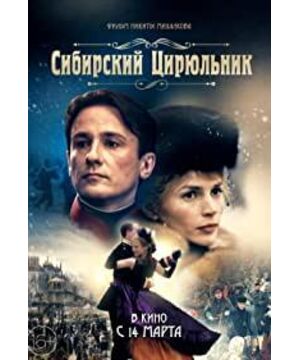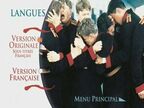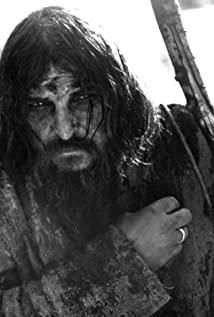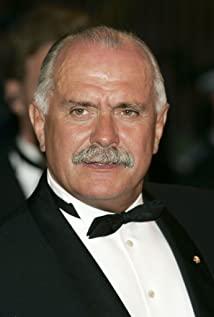this is a long story, nearly three hours long; it is also a popular story, a love story involving a troubled protagonist; but this is a story I like because it has a plot, soundtrack, An excellent mix of era backgrounds. Some people say that as long as the male protagonist of "The Barber of Siberia" is moved to the United States, and the background of the times is changed, it will be a complete Hollywood love movie. Of course, the premise that may appear is "what if". Therefore, "The Barber of Siberia" will have a grand "national screening" in the Kremlin in Moscow, rather than going to the other side of the ocean and showing it grandly in major movie theaters, waiting to earn American tears and banknotes.
"The Barber Of Siberia", before watching the film, has been thinking about the various possibilities of the story itself, such as the love of the heart, such as the human nature that has never been wiped out in suffering, such as the dense golden forest in Siberia, and the For example, the enthusiasm and unrestrainedness of the Russians, drinking thousands of glasses, these are preconceived, and they have long been a deep impression left by the Russian nation.
So it is not difficult to understand that Wu Zhongchao, who visited Leo Tolstoy's former residence and manor, could not help but feel at ease when facing the vast grasslands and vast forests, while golden dandelions, flocks of cattle and sheep, Complemented by the vast background of blue sky, white clouds and fragrant grass, he lamented that only a country as broad as Russia can nurture such a broad soul. By the way, the protagonist of "The Barber of Siberia" is also called Tolstoy, but not Leo Tolstoy, but Andre Tolstoy.
2. Although the protagonist
has countless professional and non-professional people who have repeatedly pointed out that the film "Siberian Barber" contains the self-knowledge and reflection of the Russian nation, the heavy regret for the past glory and the indescribable, integrated into the complex feelings. A unique experience with director Nikita Mikhalkov. Regrettably, in the process of watching the film, it was not this lofty and nationalistic complex that deeply attracted me, but only Andre Tolstoy's self-struggling.
The male protagonist Andre Tolstoy is a set up contradiction. On the train, he fell in love with the American heroine Jane at first sight, but when Jane deliberately asked him if he loved her, he answered in a positive tone What he loves is Russia, the country, the nation, the tsar, his parents, his maids, and so on. This kind of conflict is obviously the director's intentional arrangement, which is the so-called "vulgarity". In fact, we prefer him to live humbly for a personal love, instead of stubbornly fighting for the so-called sublime. He has a very strong jealousy, especially the fact that he was exiled directly because of the jealousy of love and hate, and this is what he said later when he taught young Tolstoy: wayward impulse ruined a young Russian sergeant life.
The climax of the conflict took place in the theater, with Mozart's "The Marriage of Figaro," an opera celebrating freedom, and Andre, who was jealous, lost his mind, snatched the strings, and slapped Radlov, who His crazy actions were immediately stopped by others, and the theater was in chaos. The torrent of love and the ensuing jealousy almost destroyed the young man's life. Tolstoy and Jane were in such a hurry that they didn't even have time to arrange a tearful goodbye. Tolstoy went to Siberia with a misunderstanding of Jane or discouragement about his feelings being drained. At this point, the film is not vulgar at all, and it is also the most heartbreaking part of the pen.
3. The film
In this long film, in addition to this unforgettable love itself, there are many passages depicting the Russian style, and even a considerable amount of space is spent to outline the glorious past of the Russian Empire a hundred years ago. The lively crowds in traditional festivals, the vodka-drinking vodka, the gang fights in the ice and snow, and the religious forgiveness day; the youthful vigor and arrogance of the non-commissioned officers when they were inspected by the tsar when they graduated, this is indeed a tribute to the Russian Empire. Suspected, although there is also an episode of the revolutionaries attacking MPs in the film. However, these beautifications have been criticized by the Russian domestic media, which is in stark contrast to the praise received abroad.
Andrei Tolstoy was escorted onto a train bound for Siberia. Friends from the non-commissioned officer school sang and performed passages from the opera, sending exiled friends away. Inside the carriage, he was motionless, but he was singing loudly with all his strength - responding to his friends in uniform on the platform, he was already a prisoner at this moment. The farewell at the station was undoubtedly a celebration of friendship, and the group of friends and Andre left many shining memories in the first half of the film. First, they got into the VIP carriage together, and then they were fined for "standing up" and waxing the floor. These shared weal and woe were full of comedy; the waltz at the ball, a pair of young people danced gracefully. In slow motion, they are valiant, elegant and charming; and the duel between Tolstoy and classmate Polievsky is actually more like Andre's own jealousy.
4.
Andre, who is ignorant of the world in love, if he is less impulsive and jealous, or if he believes in Jane's true love for him, this love that was destroyed by impulsiveness will no longer be broken and cracked. But in fact, as a foreign woman like Jane, did she really fall in love with Andre at the moment when her eyes filled with tears?
"I used to be naive to think that I could control my own destiny, but now I know that life is a vase waiting for flowers."
She did not go directly to Siberia to find Andrei, although it was explained that she was forbidden to go, so she married someone, and Andrei's maid followed to Siberia. This is Jane's logic of survival and love. In the end, she saw that Andre had a stable family, and the 10 years of waiting and expectation seemed to have disappeared all at once. Ped the horse away, leaving behind Andre with messy hair, cloudy eyes, and a face of vicissitudes, watching his lover leave.
At this time, Andre obviously has long lost his youthful radiance, and he will no longer dedicate everything to love. Therefore, he chose to stop, light a cigarette, and look at the figure who was walking away in confusion. He was given the freedom of symbolic consolation, in Siberia, but was left alive. The giant waves long for freedom, break free from the sea, and are finally smashed into waves, but the moment when the waves are gorgeous is far better than the stagnation of still water. There is so much aptness in this passage for The Barber of Siberia.
View more about The Barber of Siberia reviews











